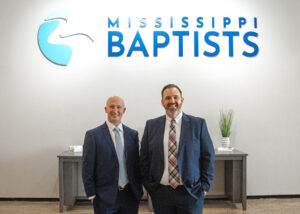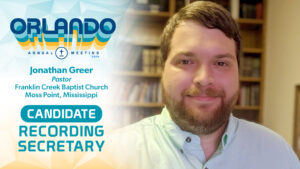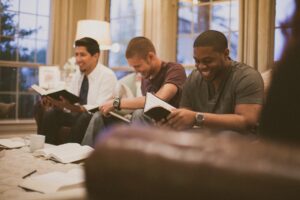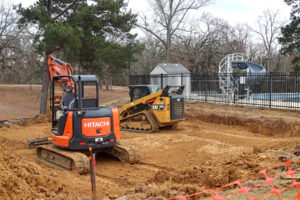By Lindsey Williams
Staff Writer
The Mississippi Baptist Conference of the Deaf (MBCD), organized by MBCB’s Multicultural Ministries, gathered Sept. 29 – Oct. 1 at Garaywa Camp & Conference Center in worship and fellowship.
Deaf and hearing brothers and sisters in Christ came together under the leadership of guest speaker Nathan Hill, pastor of Agape Deaf Baptist Church in Georgia, who preached on the theme, ‘Do You Know God?’ With hands in harmony, 106 men and women praised God Sunday morning, led by worship leader and international missionary, Peter Dublin.
Fifty-three interpreters-in-training attended the Interpreter Workshop to sharpen their skills through the instruction of Bill Ross, vice president of Hands Up Communications.
In a room full of reunions, Phyllis Smith, a deaf attendee and member of Pinelake Church, signed, “(This conference) is just a good experience of fellowship. Just to learn from these different pastors along the way has really inspired me. (I look forward) to improving the best that I can in spiritual faith.”
Treasurer of the MBCD Board since 2011, Ryan McDonald, a deaf member of Pinelake Church, started a deaf ministry at Pinelake. “(The conference) has started different relationships,” McDonald expressed, “of course with God, and then with other people, just to have that fellowship and to meet new and old people, just to have that introduction – just to know their faces.”
Reflecting on how she has seen God at work in the Deaf Conference, Ann Cothern, interpreter at First Baptist Church of Biloxi, stated, “I’ve seen it’s really grown a lot of friendships, and I can see how the deaf have grown through Christ with it meeting every year, and it’s really very encouraging.” Cothern encouraged churches to involve the deaf in church activities, to be intentionally welcoming even in the face of a language barrier, and to pray for the efforts of deaf ministry.
James Rushing, staff member of Garaywa for 13 years, and a deaf member of Morrison Heights, enjoys getting involved with the activities of the conference. Friday night during the Talent Show, Rushing performed humorous jokes, a song meaningful to him, and a personal testimony. “I’ve noticed with most deaf people,” he considered, “their parents were not raised in Baptist churches… Those deaf people do not understand who God and Jesus are, until they finally get involved in deaf churches. So they’re just kind of late to learn, late-bloomers. If they go to a hearing church, of course it’s hard to find an interpreter. Some churches do, but some of those interpreters are not skilled.”
Tiffany Langham, a member of the MBCD Board, hearing, and a Child of a Deaf Adult (CODA), expressed, “As a CODA, I just love the deaf community fellowship; I absolutely love seeing everybody’s face light up when they get to see other people and have that communication.
“I have seen God work through many young people – like the Hinds students (who participate as interpreters),” Langham affirmed. “We have had tons accept (the Gospel) last year, baptisms, and I’ve seen just a lot of change in people.
A former adjunct professor of ASL (American Sign Language) at William Carey University, Rell Webber, attended the conference to sharpen his interpretation skills. How he became involved with the deaf community was by making a deaf friend. “I went to the newspaper and put in an article that said, ‘Rell Webber wants to learn sign language. I want to meet a deaf person.’
“That next week, I was driving to work and I stopped for gas, and the man at the store said, ‘I saw your article. You want to meet a deaf person? There’s a deaf girl that’s recently graduated from the deaf school near your office.’ I was so excited! He told me where her home was, and I drove up, and there was a woman working in her yard, I waved… (he signed back and forth with her – or at least he tried to – to communicate that he wants her to teach him). Every week, she came to my office – she was my first sign language teacher – and I learned sign language.”
Webber assisted in interpreting an interview with guest pastor, Nathan Hill.
“How I grew up in the desire to preach,” Hill, the only deaf pastor in the state of Georgia, shared, “a long time ago, when I was about 12 or 13 years old, I went to a deaf camp, and a missionary who preached to us told us about how many deaf people that died without the Gospel every day – and I was just shocked! ‘Oh man! 1,000 deaf people die every day!’ So I read Romans 10:14-15, ‘How can they hear without someone preaching to them?’ I looked and I said, ‘Well I’m a Christian and I know the Gospel – what am I doing here? Why am I holding back?’
“I started telling people about the Gospel and trying to train them. But it’s hard to find a deaf person that’s qualified to be a pastor. In my county, there’s over 215 pastors of hearing people – but I’m the only one deaf in all the state!… I can’t reach all of those people, but if I can train more people, then they can become preachers and they can preach to others.”
Considering this year’s theme of the conference, ‘Do You Know God?’, Hill expressed, “Many deaf people – they miss that. They don’t understand the right kind of relationship with God. Most of them – 90% – don’t have a great relationship with their parents, so when they see that, they say, ‘I don’t want that! If the same relationship I have with my parents, I have with God, I don’t want that!’
“They need to see the Word of God through the pastor, through the church. They need to see the Holy Spirit working through the pastor… It’s not what you do, it’s what you are. You have to be a Christian.”
3.3% of Mississippi’s population is deaf – that is almost 100,000 people – and there is no deaf pastor in Mississippi.
Peter and Charity Dublin, missionaries with Converge International Ministries, also attended the conference and feel called to reach the deaf through worship. Peter, a worship leader, described the unique way in which the deaf worship, “For me, music is an important part of worship – an important part of my relationship with God. Of course, music is not a part of deaf culture… To be able to lead worship in a way that the deaf could walk away and know what worship is like when it comes to music is pretty important to me.
“Deaf worship looks a lot different. The voice is a lot lower and the bass is a lot louder because they want to be able to feel the music as we did tonight. So if you’re not ready for it, you get caught by surprise and startled a little bit…Where in English we have words that rhyme, when I’m leading worship for the deaf, I try to find similar hand shapes to tell the story, so that there’s a visual poetry.”
Neither Peter nor Charity grew up with deaf family members. At Charity’s small church growing up, a deaf elderly woman attended. All Charity knew how to sign was ‘I love you’ so she greeted her with this sign at every opportunity. As an adult, she took sign language classes at her church, met Peter (who was already very involved in deaf ministry), and made several deaf friends, who taught her how to sign. Soon they held a deaf church within their hearing church, with Peter as the pastor, and their life immersed in deaf ministry together began.
Peter learned sign language as a child because his parents studied it in order to be able to communicate with a deaf boy in their church. Whenever possible, Peter’s parents urged him to practice interpreting sermons. When he was a young teenager, his parents answered the call to be missionaries to the deaf in Trinidad. God used these experiences to call Peter to full-time missions with the deaf.
For anyone seeking to sow seeds in deaf ministry, Peter encouraged, “(The deaf) have places where they are gathering, so my first encouragement would be to go and just show up and find out what’s happening, because the best teacher is to immerse yourself. I’d say overcoming your fear would be one of the first steps because I know a lot of hearing people, just because there’s that language barrier, tend to shy away from even approaching a deaf person.
“Most assume the biggest barrier to reaching the deaf community is the language barrier,” Peter stated, “but it’s really not. The bigger barrier is trust. Many deaf people have been hurt by people who are hearing, so the first thing you have to do is build that trust with them, build that relationship.
“So for anybody wanting to do that: pray. Know that it’s a long journey… Find somebody and go for it.”
The author of this article may be contacted at lwilliams@mbcb.org.








